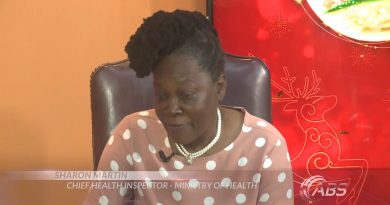CBH observes Mosquito Awareness Week with appeal to households to cover water containers and reduce breeding
The Central Board of Health (CBH) is celebrating Mosquito Awareness Week, which commenced on Sunday, May 21, with a church service at the Ottos Wesleyan Holiness Church.
It is being observed because these insects can affect the physical health and well-being of the country’s residents and even visitors.
Chief Health Inspector Sharon Martin says there has been a recent proliferation of the disease-causing insects, especially during the rainy season.
Martin says that mosquito breeding is a big problem faced by the CBH, since households routinely put out containers, such as baths and buckets, to catch what many locally refer to as “good water” – that is, rainwater – and do not cover them, or fail to do so correctly, after harvesting the water.
This is what creates the problem, the chief health inspector says; hence, residents should always cover these containers, even with a piece of cloth – or anything that will prevent mosquitoes from laying their eggs inside.
Martin says that mosquitoes need water for at least three stages of their lives – egg, larvae (or wrigglers), and pupae. Without the already scarce commodity, the eggs will not hatch and this will lessen the mosquito population, she notes.
Meanwhile, Martin says that, on a daily basis, health inspectors are deployed island wide, especially to areas where mosquito breeding is endemic.
She notes that mosquito breeding in households is a habit, a malpractice, with poor storage of water.
The persistent drought adds to the improper storage of water, she points out, as residents often fill containers with piped water to utilize on those days when the supply has been suppressed – and then leave them open to the pests.
She advises that cooking oil can be added to water that is used domestically in order to stop mosquito breeding, while kerosene oil can be applied to drains and other sources of non-useable water.
Mosquito eggs are microscopic, and one becomes aware of their presence only after seeing wrigglers, the chief health inspector notes. However, she says there are several ways to rid containers of the insects, including straining the water, since, in the current drought, every drop of the commodity is essential.
Because mosquitoes can withstand adverse weather conditions, the CBH head says it is vital to properly scrub the sides of containers after they have been emptied and before refilling.
During the Week’s activities, Martin says the focus will be put on school children, who are more obedient and compliant and can assist their parents to reduce the mosquito population.




